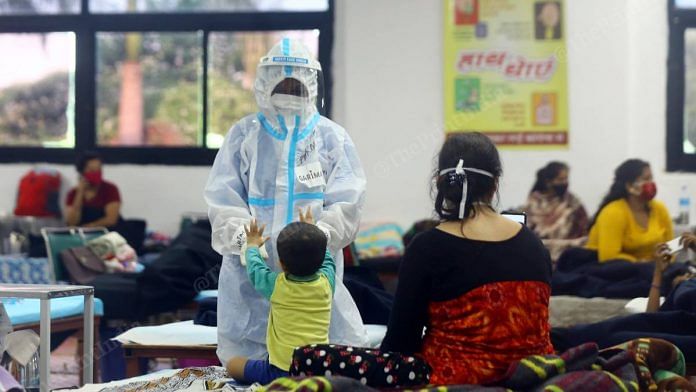New Delhi: Contact tracing of Covid positive cases in the national capital has been “very limited since the beginning” and needs to be rationalised, according to a report prepared by the National Centre for Disease Control.
The report, drafted under the guidance of an expert group headed by Niti Ayog member V.K. Paul, has been submitted to the Delhi government, and focuses on a ‘revised strategy for control of Covid-19 version 3.0’.
It highlights the need to revamp containment strategy, reduce mortality, prepare for a surge in cases, and scale up testing in Delhi.
While a senior Delhi government official confirmed having received the report, he said he cannot comment on what suggestions will be implemented. Sources told ThePrint that deliberations are on.
ThePrint reached health minister Satyender Jain through phone calls or messages, but there was no response till the time of publishing this report. The story will be updated when he does.
Infection spreading from workplaces to families
The report, accessed by ThePrint, says the infection is now spreading from workplaces to families as offices are becoming hotspots.
With “gradual opening up of offices and economic activities, workplaces are becoming hotspots and infection is spreading from workplaces to families,” reads the report, adding that “the number of contacts traced per positive case on average remained only up to 7 to 10 per cent.”
The panel has recommended that workplace clusters should be identified for risk assessment across all districts. “Districts should keep data of positive cases in offices ready,” the report says.
Also read: Super-spreaders behind India’s explosive Covid outbreak, study in Science says
Testing in containment zone limited
Observing how the majority of the testing in containment zones and of contacts of positive patients has been limited, the report highlights the need to test high-risk contacts, even if they are asymptomatic.
“It has been specifically observed in around six to eight districts, where positivity rate is high, the samples collected are quite low,” reads the report, adding that the minimum test criteria of “Tests per million > 140 per day” and positivity below 5 per cent should be adhered to.
Prepare for 15,000 cases a day, reduce mortality
The report draws attention towards three reasons that “may cause excessive pressure on healthcare services” — 1) Winter months that make respiratory illnesses severe, 2) Patients may come from outside Delhi in large numbers, 3) Patients who come from distant areas are likely to be more serious.
It also states that there could be a sudden rise in Covid cases due to festival-related gatherings. The panel recommends that Delhi should be prepared for a daily surge of 15,000 positive cases and make arrangements for inpatient admissions with moderate and severe disease roughly amounting to 20 per cent of the surge.
The panel has also recommended measures to reduce mortality in Delhi. “Reducing mortality to the extent possible should be one of the key objectives of managing the pandemic,” reads the report, raising concerns over how 1.5 per cent reported mortality cases in Delhi are children below 15 years and 17 per cent is people between 15-44 years age group.
The panel suggests early identification of symptoms, focus on elderly and those with comorbidities, periodic review of triage facilities and ambulance systems.
Also read: Delhi’s Hindu Rao Hospital doctors threaten to withdraw from Covid duty over salary non-payment
Focus on home isolation
The report elaborates upon how the proportion of active cases under home isolation should be to the extent of 50-60 per cent.
Mortality analysis of three central government hospitals revealed percentage of Covid patients brought dead — 15 per cent at RML, 6.5 per cent at Safdarjung Hospital and 44.6 per cent at Lady Hardinage.
“Although dramatic course of illness is inevitable, but to some extent, it could be attributed to a system gap in proper triaging, selection of patients to put under home isolation and delay in accessing critical care,” states the report. The panel has, therefore, recommended strict monitoring of cases under home isolation.
The report also says that about 80 per cent cases are being reported from outside containment zones, and there is a need to revise the existing containment zone strategy.
“The testing in the containment zones is being done almost exclusively by RAT but proportion of RAT negative symptomatic being retested by RT-PCR is limited,” adds the report.
Also read: Covid trials only the latest, India’s place in vaccine history dates back to 19th century



